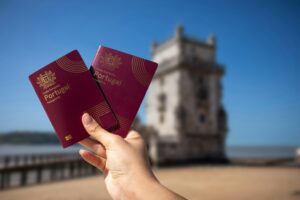How much does it cost to get Portuguese citizenship via the Golden Visa?
Welcome back to the channel where we explore second citizenships and residency-by-investment programmes. I am Jonathan, a leading Golden Visa consultant with an extensive track record in this field, supported by a remarkable team that has successfully guided clients from all over the world through the Portugal Golden Visa process.
In today’s post, we will take a detailed look at the costs involved in the journey to Portuguese citizenship via the Golden Visa route. We will begin with a brief recap of what the Golden Visa is, how it leads to citizenship, and then break down each category of associated costs. This includes legal and government fees, as well as supporting expenses such as document legalisation and tax representation. Additionally, we will explore how to assess these costs in light of the potential returns and long-term value of obtaining European citizenship.
If you are serious about pursuing this route, understanding the financial commitment is essential. This post will provide the clarity you need to make an informed decision.
A Brief Overview: What Is the Portugal Golden Visa?
For those unfamiliar, the Portugal Golden Visa was introduced in 2012 and has since become one of the most popular investment-based residency programmes in Europe. It allows non-EU nationals to secure a residency permit in Portugal in exchange for a qualifying investment—most commonly starting at €500,000, though certain innovative structures may reduce this requirement.
Crucially, the programme does not require you to live in Portugal full-time. It is now the only such programme in Europe still operating, following the closure of Malta’s offering. Portugal is therefore widely regarded as the continent’s primary gateway to EU citizenship through investment, particularly looking ahead to 2025.
To meet the requirements, a physical presence in Portugal is still necessary, albeit minimal. Applicants must spend at least one week per year in the country, which is considered the bare minimum to establish a connection sufficient for naturalisation.
Growing Popularity and Eligibility
With around 30,000 Golden Visas issued to date, the programme continues to see year-on-year growth. One of its key strengths is its inclusivity. In most cases, you may include your immediate family members in your application—this means dependent children and parents, though not siblings unless you hold legal guardianship.
Applicants must have a clean criminal record to qualify. Beyond that, the programme is both legally sound and firmly established as a viable route to citizenship. Portugal has been granting citizenship to Golden Visa holders since 2018, even to those who have never lived in the country or become tax residents there.
My team and I have personally managed more than 10 percent of all Golden Visa cases ever approved in Portugal. We have successfully navigated every iteration of the programme and maintained a 100 percent success rate to date. You would be working with a thoroughly experienced team.

What Are the Costs of the Portugal Golden Visa?
Let us now dive into the financial breakdown, beginning with the key categories to understand the cost of Portuguese citizenship:
Legal Fees
Legal fees are typically the first cost to consider. These are paid to your lawyer or Golden Visa agent for managing and processing your case. The level of service you choose will influence the fee. A basic submission-only service differs substantially from an end-to-end support model that includes comprehensive guidance through to the citizenship stage. Naturally, the more hands-on the service, the higher the cost.
Tax Representation
Applicants are required to appoint a tax representative in Portugal, particularly to liaise with the national tax authority, Finanças. This used to be mandatory for all residents, but the law has recently become more flexible. Expect to pay between €150 and €300 per adult. Minor children are not subject to this requirement.
Document Legalisation and Apostilles
To submit a Golden Visa application, you will need to provide various supporting documents. These must be legalised for use in Portugal, typically via an apostille from a notary in your country of residence. The cost for this process generally falls between €500 and €1,000 per family. If your documents are not in English, French, Spanish or Portuguese, official translations will be necessary, adding to the expense.
Note that documents in English, French or Spanish no longer require translation into Portuguese. However, regardless of language, all foreign documents must be apostilled to be accepted by Portuguese authorities.
Investment Capital
The investment itself represents the largest single cost and will range between €250,000 and €500,000 depending on the specific route taken. This is the qualifying financial commitment that underpins your eligibility for the Golden Visa. This is the major cost of Portuguese citizenship.
Government Fees
There are two sets of government fees to be aware of:
-
Application Fees
These are payable at the time of submission and are currently €606 per person, regardless of age. -
Golden Visa Card Fees (Success Fees)
Once you receive pre-approval and attend your biometric appointment, you must pay the Golden Visa card issuance fee. This is €6046 per person and is also age-independent. These figures are accurate as of May 2025.

Timeline and When Fees Are Payable
Let us now walk through the process and indicate when each payment typically arises, so you can understand the cost of Portuguese citizenship:
-
Initial Stage
Once you decide to proceed, you will begin by selecting an investment. Background checks will be conducted, and a client agreement will be signed. At this point, legal fees are due. -
Application Setup Phase
You will receive a Portuguese tax number, and a bank account will be opened in your name. During this phase, you will also begin gathering and legalising documents. Tax representation and document legalisation costs are incurred here. -
Investment Phase
Once your documentation is complete and the bank account is ready, you will transfer your investment funds. This will typically occur around the three-month mark, though timing may vary depending on the investment vehicle. -
Application Submission
After the investment has been finalised, your Golden Visa application is formally submitted. You will receive your ARI number—Autorização de Residência para a Atividade de Investimento—at this point. This marks your official entry into the system, establishes your grandfather rights should the law change, and begins the five-year countdown to citizenship eligibility. Application fees are paid at this stage. -
Biometric Appointment and Card Issuance
Approximately one year after submission, you will be invited to Portugal for your biometric appointment. This is the only point in the process that requires physical presence in the country. You will receive 30 to 90 days’ notice. Once pre-approval is granted, the Golden Visa card fees become payable. Following this, your cards will be couriered to your home address, concluding the main stage of the application.
The entire process typically spans around 18 months from start to card issuance.
Key Considerations
The Portugal Golden Visa is undeniably a significant financial undertaking, particularly for larger families. Most fees—especially the government charges—are levied on a per-person basis. While the required investment is straightforward, the government fees are notably higher than in many other countries offering similar programmes. This is largely because Portugal currently stands alone in offering remote access to EU citizenship, making the programme highly sought-after and giving the authorities little incentive to reduce costs.

Understanding the Real Value and Cost of Portuguese Citizenship Through the Golden Visa
As we continue our comprehensive look at the costs, structure, and strategic considerations behind the Portuguese Golden Visa, we now turn to a fundamental question: what is the real value of citizenship to you?
This is a crucial lens through which to evaluate your investment—not merely in financial terms, but in the broader context of life planning, security, and opportunity.
Value Beyond Investment Returns
The Portuguese Golden Visa is often viewed as a vehicle not primarily for capital growth, but for long-term benefits such as mobility, security, and EU citizenship. While some investors might still seek to generate a return from the underlying investment, many more treat the European passport itself as the primary ROI.
For conservative investors, this might mean selecting investments geared towards capital preservation and lower risk exposure. For those with a more aggressive risk appetite, it’s essential to understand that chasing higher returns within the Golden Visa ecosystem typically entails a corresponding increase in risk. This investment category is, by its nature, more limited than the global market, and the returns are usually more modest.
As such, it is often advantageous to separate your Golden Visa investment from your wider wealth generation strategy. Doing so allows you to focus this capital on obtaining citizenship while preserving your more flexible assets for higher-yield or growth-oriented opportunities elsewhere.
Limiting Capital Deployment for Maximum Efficiency
Another important strategic consideration is the amount of capital deployed. The goal here is not to overextend. By committing the minimum amount required to meet the Golden Visa’s eligibility, you can free up more of your financial resources for other initiatives.
This approach helps reduce opportunity cost—an important concept in wealth management. The Portuguese Golden Visa is a means to an end, not necessarily a tool for direct financial return. Understanding this distinction is key to long-term satisfaction with the programme.
For a more detailed discussion on how to optimise your investment strategy in the context of the Golden Visa, you can refer to some of the more specialised content available on our YouTube channel.

From Golden Visa to Citizenship: The Full Journey
While obtaining the Golden Visa is the first and perhaps most discussed step, the ultimate goal for many is Portuguese citizenship. It’s essential to understand how the visa leads to this outcome, and what steps are involved along the way. The cost of Portuguese citizenship must also be understood.
Timeline and Process
Portugal has been granting citizenship to Golden Visa holders since 2018, so this is well-established ground. The basic requirements include:
-
Five years of legal residency – satisfied by maintaining your Golden Visa investment.
-
Minimal physical presence – an average of just seven days per year in Portugal.
-
Demonstration of ties to Portugal, most commonly:
-
Passing the CEFR A2 level Portuguese language test (called the CIPLE), or
-
Completing a 150-hour language course, often done online.
-
Many families choose the language course route as a shared activity—particularly appealing for those with children, as it builds cultural understanding and family engagement.
Further reinforcing ties—though not legally required—can enhance your citizenship application. Examples include joining Portuguese-focused organisations, participating in local events, or even attending football matches or food festivals. This is the non-monetary cost of Portuguese citizenship.
A Significant and Welcome Change: The Start Date Shift
In a particularly beneficial development, the five-year residency requirement now begins from the date of Golden Visa application submission, rather than from the issuance of the residence permit. This shift can save applicants up to 18 months, accelerating the path to citizenship significantly.
Visa Validity, Renewals, and Planning Ahead
Golden Visas are issued with an initial two-year validity, after which they must be renewed. Each renewal also lasts for two years, and these renewals incur both government and legal fees.
Due to evolving processing times and uncertain future norms, it is advisable to plan for two renewals, even though it may turn out that only one is necessary. Just one renewal would reduce your cost of Portuguese citizenship. With current timelines, a full journey to citizenship generally takes about seven years from the date of application.
Language Requirements and Family Considerations
Every person applying for citizenship must meet the language requirement—either through the test or course. If opting for the course, expect a commitment of 150 hours. Importantly, the test can be taken multiple times within the five-year period and is not overly demanding.
This requirement extends to all applicants, not just the primary Golden Visa holder. And once the citizenship application is approved, that’s when you can consider unwinding your investment and implementing your pre-agreed exit strategy.
Why Portuguese Citizenship Is So Valuable
Portuguese citizenship is particularly attractive for several reasons:
-
Dual citizenship is allowed, unlike in Spain, which restricts this right.
-
It grants full EU rights, including the ability to live, work, retire, or study in any of the 27 EU countries—not just Portugal.
-
Holders gain visa-free access to over 180 countries globally.
-
It opens doors to European banking and business opportunities, often inaccessible to non-EU citizens.
-
Critically, Portuguese citizenship does not change your tax status unless you also become a Portuguese tax resident.
For families, it is a multigenerational legacy. Portuguese citizenship can be passed down, offering long-term security and mobility for children and future generations.
Portugal: The Most Accessible EU Citizenship Route
Though many EU countries offer similar citizenship benefits, Portugal stands out for its accessibility:
-
No requirement to live in-country.
-
Moderate investment thresholds.
-
Streamlined and well-established naturalisation process.
These elements make it a unique and compelling option for non-EU nationals seeking the benefits of European citizenship.
Understanding the Cost of Portuguese Citizenship
When budgeting for citizenship, you should plan for the following:
-
Government fees: Around €250 per person (subject to change).
-
Lawyer fees: Typically €750 per person, though this can vary.
As mentioned earlier, Portugal does not levy tax based on citizenship. You are only liable for taxes in Portugal if you become a tax resident. Even then, this applies only to Portuguese-sourced income and capital gains, not worldwide income.
Passport Renewals and Physical Presence
Portuguese passports are valid for 10 years, and renewing them is straightforward. There is no requirement for physical presence in the country to complete the renewal process.

Navigating the Final Stages of the Portuguese Golden Visa and Citizenship Journey
As we near the conclusion of this overview of the cost of Portuguese citizenship, it’s worth revisiting an essential piece of advice for anyone considering the Portuguese Golden Visa route: ensuring you fully understand the investment landscape is critical. The process of securing citizenship is not just a legal formality — it hinges on making smart, informed investment decisions that meet both regulatory requirements and your personal financial goals.
The Investment: The Engine of Your Golden Visa Journey
At the heart of the Golden Visa process lies the investment itself. Selecting the right vehicle is not merely a bureaucratic necessity — it is a strategic choice that can influence your financial security, the ease of the application process, and ultimately your satisfaction with the entire journey.
There is a wide array of investment options available, from real estate to investment funds, cultural or scientific contributions, and more. However, these vary significantly in terms of complexity, fee structure, risk, and long-term viability. Some come with hidden costs or long lock-up periods, while others may be unsuitable depending on your risk appetite or liquidity requirements.
It’s critical to evaluate these factors carefully. If you are new to international investing, you might find the landscape complex — and even intimidating. This is perfectly normal. Even seasoned investors can find themselves navigating unfamiliar terrain when investing in a foreign jurisdiction with different legal, tax, and regulatory environments.
A Word to the Wise: Seek Education Before Commitment
In light of these challenges, it’s highly recommended that you educate yourself thoroughly before committing any capital. Understanding your investment options, the implications for your broader financial strategy, and how they align with your personal goals should be considered non-negotiable first steps.
To support this, a dedicated video has been created to explore the investment component of the Golden Visa in depth. While modesty prevents too much self-promotion, the content is designed with clarity and thoroughness in mind and is considered essential viewing for those at the decision-making stage. This resource provides a structured overview of your options and the pros and cons of each, equipping you with the insight needed to make informed decisions.
Final Thoughts (Without a Conclusion)
This detailed examination of the Portuguese Golden Visa has sought to illuminate not just the mechanics of the process, but also the strategic considerations involved at every stage — from initial costs and legal requirements to the value of citizenship and the nuances of the investment process. For prospective applicants, taking the time to understand these layers thoroughly can lead to a smoother, more secure, and ultimately more rewarding journey towards Portuguese citizenship and all the freedoms that come with it.
Does these Portugal Golden Visa options fit your objectives, or would you like to explore the matter further?
For a personal review and advice tailored to your situation, click the button below for a free consultation with Jonathan.

